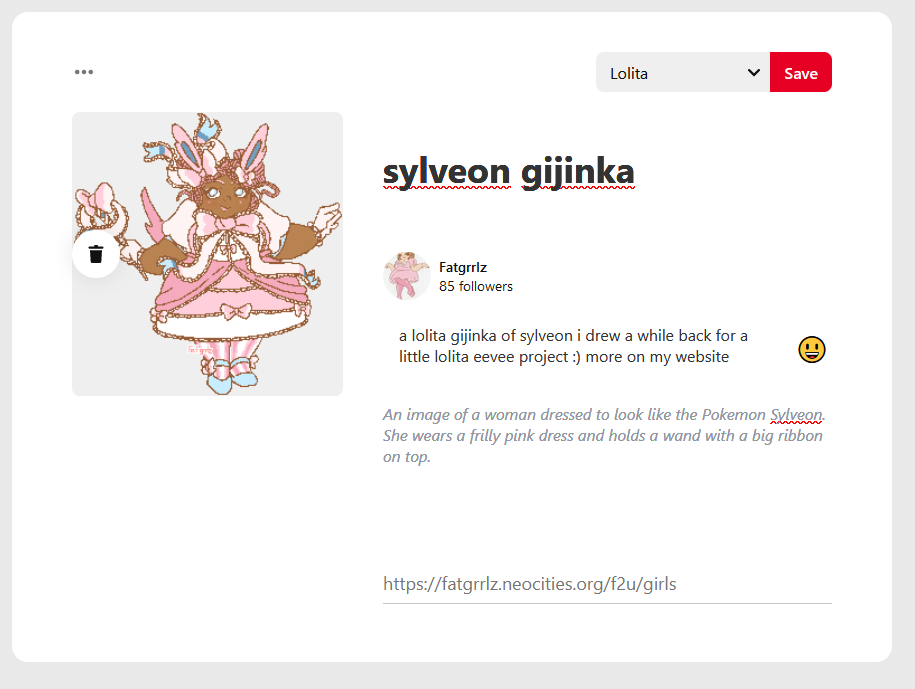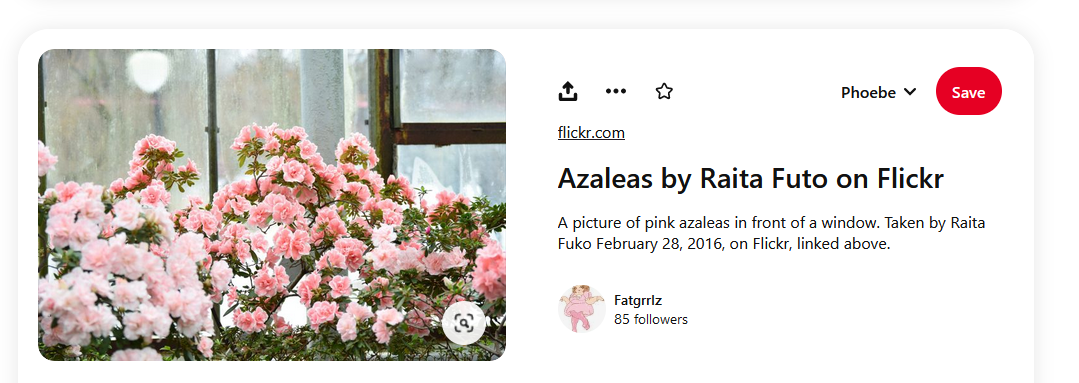On Pinning: Don't Be A Dick - Source Your Shit
Being someone with a long and historied background in art, I've had my fair share of dealing with art thieves -
people who download your art, share it elsewhere and
either claim that they made it themselves, or the more common occurence: they leave it uncredited, or simply say "credit to the artist". Think those art aggregate accounts on
Tumblr or Instagram, though the Indie Web is plagued by this issue as well, with the added caveat of many "free-to-use" graphics whose sources are now long exinct, their links
dead.
I think it's important to mention that simply sharing art (or whatever media in question) typically isn't a bad thing, and most artists even encourage sharing with the caveat that you should credit and link back.
But that's the kicker: having credit ensures that, if someone sees their art and wants to see more of it, they have the link back to the artist itself easily accessible.
For some artists online, creating art is how they put food on the table, and it is through sharing their art elsewhere with a link back that enables the artist
to receive more business.
And even then, on a macro scale - if someone makes something, and that someone's not you, it's probably a good idea to give credit.
To the surprise of nobody, Pinterest is kind of notorious for art theft and people uploading shit and not providing any sources or even a mention of who the hell created the thing they've uploaded. This, in turns, creates a game of telephone where you find people finding the uncredited pin more than the actual creator, and that source is lost. It's a huge fuckin' problem. I wanted to dedicate a page as a guide for pinning with credit, and how to determine if a pin is sourced correctly.
When creating a pin, a good rule of thumb to have is to interrogate the source before saving that pin. Is it yours - something you made? Then, by all means, go ahead and pin it yourself. It'd probably be worthwhile to go the extra mile and mention on the description that it was art you made, a picture you took, an outfit that's on you. If you have an account on social medias or your own website, why not link to it while you're at it? Not only are you the source, but you're giving folks a link back to see what else you've made. A win-win.
Where it gets a little more complicated is if you're not the original creator. You gotta find that source before you pin it. Why? Well, pins are public, so anyone can see your pins, even if you intend on saving them to private boards. A good way to find sources for images is through using Google Image's reverse image search function. I like using Flickr for finding photography (if you want to find those funky #aesthetic type pictures, search "flat lay"), and Door11 / NowFashion for fashion, among other sources. Also, make sure to double check the source to make sure it's kosher to share - some folks aren't okay with their stuff being shared even with credit, and that should be respected. Businesses are typically fine with pins, individuals less so, but you should check their About pages or their websites to make sure.
Then, when you create the pin, you'll first hit "Save from URL" instead of uploading the image. This option will pull the images on the website and allow you to pick the image, which it then automatically adds the URL and the image to the pin. All you have to do from there is add a title, a description, and alternate text.

An example of a completed pin, ready to be saved. It has a title, description, alternate text, and a URL linking back to the source. Since it's something I made, I noted that I made it and to look at my website for more.

Another example of a completed pin, this time of an image taken by Raita Fuko and uploaded to Flickr. I've provided a brief description of the image, as well as attribution to Raita, when the image was taken, and a link to Raita's picture on Flickr.
But what about other people's pins? You can't guarantee that people pinning on Pinterest are sourcing correctly, especially when it's literally notorious for flooding Google Image search results with images uploaded to the site, drowning the actual creators that make the art or pictures or any other content you're looking for.
When looking at a prospective pin someone else has created that you'd like to save, ask yourself the following questions:
- Does the pin have a link?
- Where does the link on the pin go to?
- If there is no link, is there a handle provided by the pinner?
This doesn't guarantee that it's credited properly - and the pinner can even be the original poster. Check the pinner's profile. Are the other pins they've created and pinned similar to one another? Do they have links to other social medias? Note that this isn't surefire either, and there are cases where the pinner might be pretending to be the original poster. Use your best judgement on pins that do not have link attributions.
This is a given - if it links directly to an image, or to another pin, that's a bad pin to use because it doesn't correctly attribute the creator. Same with the likes of Giphy. Twitter, Tumblr and Instagram links might link to the original creator, but they might also link to someone reposting the images on those respective platforms - and it's a toss-up on whether or not if the original creator has been properly credited. Etsy pins are typically pretty reliable, but again, you wanna check that before you pin.
No link isn't ideal, but some pinners may provide the handle to the original creator. While this does help to some degree, it's kind of a shit way of crediting - many people take on many different handles online, and some creators only exist on certain platforms. What this means is, for more popular creators, some may take their handles on social medias they don't use and pretend to be them. Or, it could be as simple as someone else having claim to the handle before them and it's just two different people. As such, it's probably better to save a pin that says "@fatgrrlz on Tumblr" than just "@fatgrrlz".
When in doubt, if it doesn't seem right - unless you're real attached to it and willing to go through the efforts of reverse google searching, don't pin it!
///